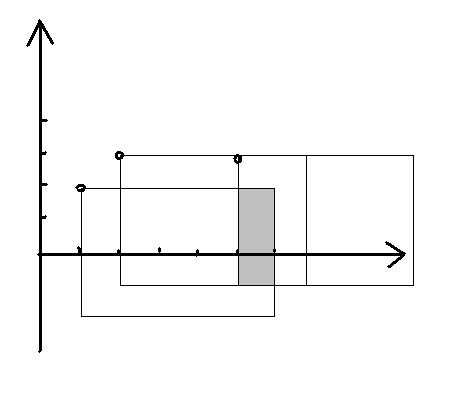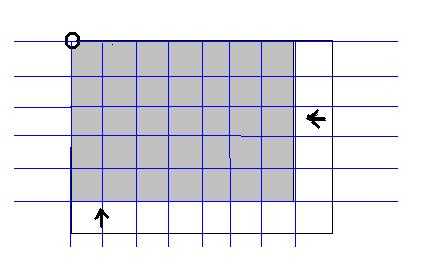Luogu P1502 窗口的星星
Posted hlauv
tags:
篇首语:本文由小常识网(cha138.com)小编为大家整理,主要介绍了Luogu P1502 窗口的星星相关的知识,希望对你有一定的参考价值。
(复制一下题面好了~)

题目背景
小卡买到了一套新房子,他十分的高兴,在房间里转来转去。
题目描述
晚上,小卡从阳台望出去,“哇~~~~好多星星啊”,但他还没给其他房间设一个窗户,天真的小卡总是希望能够在晚上能看到最多最亮的星星,但是窗子的大小是固定的,边也必须和地面平行。这时小卡使用了超能力(透视术)知道了墙后面每个星星的位置和亮度,但是小卡发动超能力后就很疲劳,只好拜托你告诉他最多能够有总和多亮的星星能出现在窗口上。
输入输出格式
输入格式:
本题有多组数据,第一行为T 表示有T组数据T<=10
对于每组数据
第一行3个整数n,W,H,(n<=10000,1<=W,H<=1000000)表示有n颗星星,窗口宽为W,高为H。
接下来n行,每行三个整数xi,yi,li 表示星星的坐标在(xi,yi),亮度为li。(0<=xi,yi<2^31)
输出格式:
T个整数,表示每组数据中窗口星星亮度总和的最大值。
输入输出样例
说明
小卡买的窗户框是金属做的,所以在边框上的不算在内。
喜欢这个题目背景~
这类题目有一个很巧妙的转化,把移动的窗口(面)和星星(点)转成 可以覆盖到星星的(面)和窗口的左下角(点)
什么意思呢?(可以结合下面的图片理解)
把每一个星星作为右上角,在它的左下方划出一片窗口大小的区域,表示只要窗口的左下角落在这一片区域里就一定能覆盖到这颗星星。
那么不同星星的重叠部分就代表能同时覆盖这几颗星星了。
(下图中,只要窗口落在阴影部分,就能同时覆盖到三颗星星)

所以这一题的解法就是:
想象一条扫描线从左扫到右边,只要进入了星星的区域,扫描线上这段区间就可以取到这颗星星的值,等过了区域再减去这颗星星的值。
那就可以用线段树来做啦,每次挪动找出区间的最值更新答案就可以了。
看到题目最后的提示:小卡买的窗户框是金属做的,所以在边框上的不算在内。(惊!
边框居然不算,好吧那就只好把范围缩小,到了阴影部分外的那条平行y轴的线就可以把这颗星星的贡献减掉了。(用Windows XP 画的的图,有点丑)

还有,星星的坐标很大,记得离散化。
具体操作细节可以看代码(用了vector来维护坐标上加和减的星星)
(代码虽然很长,但结构还算清晰吧)
1 #include<iostream> 2 #include<cstdio> 3 #include<cstring> 4 #include<cstdlib> 5 #include<vector> 6 #include<algorithm> 7 8 #define For(i,a,b) for(int i=a;i<=b;++i) 9 #define Pn putchar(‘ ‘) 10 #define llg long long 11 12 using namespace std; 13 14 const int N=2e4+10; 15 16 struct LIS{ 17 int x,y,id; 18 }Lis[N*2]; 19 20 struct Star{ 21 int x1,x2,y1,y2; 22 llg lgt; 23 Star(){ 24 x1=0; x2=0; y1=0; y2=0; 25 lgt=0; 26 } 27 }st[N]; 28 29 vector<int>ads[N]; 30 vector<int>mns[N]; 31 32 int tot=0,n,m,W,H,x,y; 33 llg tag[N*4],mx[N*4],ans=0; 34 35 void read(int &v){ //读入优化,和输出优化 36 v=0; bool fg=0; 37 char c=getchar(); if(c==‘-‘)fg=1; 38 while(c<‘0‘||c>‘9‘){c=getchar(); if(c==‘-‘)fg=1;} 39 while(c>=‘0‘&&c<=‘9‘){v=v*10+c-‘0‘,c=getchar();if(c==‘-‘)fg=1;} 40 if(fg)v=-v; 41 } 42 void read(llg &v){ 43 v=0; bool fg=0; 44 char c=getchar(); if(c==‘-‘)fg=1; 45 while(c<‘0‘||c>‘9‘){c=getchar(); if(c==‘-‘)fg=1;} 46 while(c>=‘0‘&&c<=‘9‘){v=v*10+c-‘0‘,c=getchar();if(c==‘-‘)fg=1;} 47 if(fg)v=-v; 48 } 49 void write(int x){ 50 if(x>9)write(x/10); 51 int xx=x%10; 52 putchar(xx+‘0‘); 53 } 54 //排序 55 bool cmpX(const LIS &a,const LIS &b){ 56 return a.x<b.x; 57 } 58 bool cmpY(const LIS &a,const LIS &b){ 59 return a.y<b.y; 60 } 61 //线段树操作 62 void pDown(int o){ 63 llg tg=tag[o]; tag[o]=0; 64 int ls=o<<1,rs=o<<1|1; 65 tag[ls]+=tg; tag[rs]+=tg; 66 mx[ls]+=tg; mx[rs]+=tg; 67 } 68 void Ins(int o,int l,int r,int lx,int rx,llg dt){ 69 if(lx<=l&&rx>=r){ 70 mx[o]+=dt; tag[o]+=dt; 71 return; 72 } 73 int m=(l+r)>>1; 74 int ls=o<<1,rs=o<<1|1; 75 if(tag[o])pDown(o); 76 if(lx<=m)Ins(ls,l,m,lx,rx,dt); 77 if(rx>m)Ins(rs,m+1,r,lx,rx,dt); 78 mx[o]=max(mx[ls],mx[rs]); 79 } 80 81 int main(){ 82 int T; read(T); 83 while(T--){ 84 tot=0; ans=0; 85 memset(tag,0,sizeof(tag)); 86 memset(mx,0,sizeof(mx)); 87 88 read(n); read(W); read(H); 89 For(i,1,n){ //存下星星区域的右上角和左下角 90 read(x); read(y); read(st[i].lgt); 91 st[i].x1=st[i].x2=st[i].y1=st[i].y2=0; 92 Lis[++tot].x=x; 93 Lis[tot].y=y,Lis[tot].id=i; 94 95 Lis[++tot].x=x+W-1; 96 Lis[tot].y=y-H+1,Lis[tot].id=i; 97 } 98 Lis[0].x=-2147483600; 99 Lis[0].y=-2147483600; 100 101 sort(Lis+1,Lis+tot+1,cmpY); //分别对X和Y离散化 102 int ty=0; 103 For(i,1,tot){ 104 if(Lis[i].y!=Lis[i-1].y)ty++; 105 int ID=Lis[i].id; 106 if(!st[ID].y2){ 107 st[ID].y2=ty; 108 }else{ 109 st[ID].y1=ty; 110 } 111 } 112 113 sort(Lis+1,Lis+tot+1,cmpX); 114 int tx=0; 115 For(i,1,tot){ 116 if(Lis[i].x!=Lis[i-1].x)tx++; 117 int ID=Lis[i].id; 118 if(!st[ID].x1){ 119 st[ID].x1=tx; 120 }else{ 121 st[ID].x2=tx; 122 } 123 } 124 125 For(i,1,tx+1){ //初始化vector 126 ads[i].clear(); 127 mns[i].clear(); 128 } 129 130 For(i,1,n){ 131 int lx,rx; //把星星挂到相应的横坐标上 132 lx=st[i].x1; //ads为加, mns为减 133 rx=st[i].x2+1; 134 ads[lx].push_back(i); 135 mns[rx].push_back(i); 136 } 137 For(i,1,tx){ 138 int sz; 139 140 sz=mns[i].size(); 141 For(j,0,sz-1){ //先减后加 142 int ID=mns[i][j]; 143 int lx,rx; 144 lx=st[ID].y2; 145 rx=st[ID].y1; 146 Ins(1,1,ty,lx,rx,-st[ID].lgt); 147 148 } 149 150 sz=ads[i].size(); 151 For(j,0,sz-1){ 152 int ID=ads[i][j]; 153 int lx,rx; 154 lx=st[ID].y2; 155 rx=st[ID].y1; 156 Ins(1,1,ty,lx,rx,st[ID].lgt); 157 } 158 ans=max(ans,mx[1]); 159 } 160 write(ans); Pn; 161 } 162 return 0; 163 }
以上是关于Luogu P1502 窗口的星星的主要内容,如果未能解决你的问题,请参考以下文章